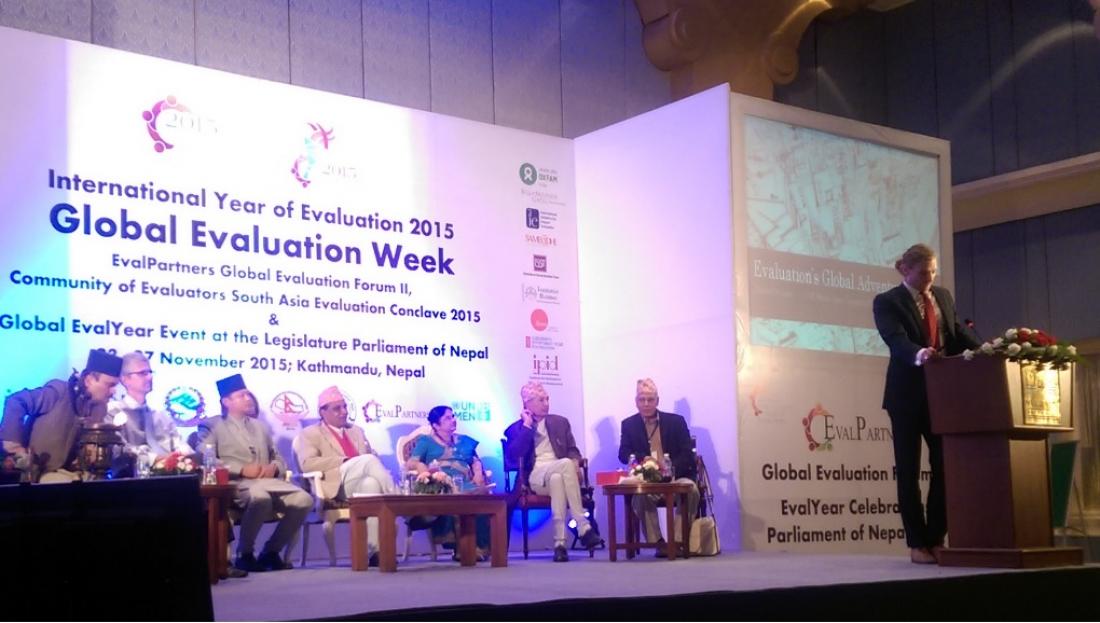IDRC’s Robert McLean delivers a keynote speech as part of the inauguration panel at the Evaluation Conclave
The CoE-SA and IDRC cherish a longstanding relationship of knowledge exchange and co-promotion of the critical significance of quality evaluation for development.
United Nations Secretary-General Ban Ki-Moon lit the torch for the “EvalYear” at UN Headquarters at the outset of 2015 and the torch was passed around the world over the year, coming to rest in Kathmandu, Nepal at the CoE-SA’s Conclave in November 2015. The purpose of the United Nations “EvalYear” was to advocate for and promote evaluation as well as evidence-based policymaking at international, regional, national, and local levels.
IDRC’s Robert McLean delivers a keynote speech as part of the inauguration panel at the Evaluation ConclaveRobert McLean, Senior Program Specialist in Evaluation at IDRC, was invited to present an inaugural keynote address at the Conclave. IDRC shared the inauguration platform at this historic event with the Right Honourable Prime Minister of Nepal, Khadga Prasad Sharma Oli. Conclave participants in Kathmandu included international Parliamentarians, government officials, civil society representatives, and evaluators. For Nepal, a country in a period of post-earthquake aid influx, locally led evaluation and evidence-based decision-making holds tremendous importance and IDRC was honoured to contribute knowledge and support to this cause.
Altogether 376 participants from 61 countries attended the event. The primary theme of the Conclave, “Building bridges: Use of Evaluation for decision-making and policy influence,” encouraged state and non-state actors to use evaluation for decision-making in the advent of the Sustainable Development Goals. The key messages of Conclave 2015 were: use, participation, equity, and gender. The event was held in collaboration with EvalPartners (an association aimed at advancing the field of evaluation internationally) and the Parliamentarians’ Forum (an international collective of parliamentarians who are committed to promoting evaluation).
It is critical to learn what policies or programs are most effective in supporting positive change in our world. Evaluation can help countries uncover solutions. The Conclave was an event where those who conduct evaluations, and those who use them, discussed the approaches and methods best suited to priority questions in the context of issues facing South Asia and other regions of the world.
At the event, IDRC hosted Hon. Sherdhan Rai, Minister of Communications and Information Technology of Nepal, and Hon. Ananda Prasad Pokharel, Nepal’s Minia book launch for the joint publication with SAGE Publications India, entitled Evaluation in the Extreme. Co-edited by Colleen Duggan and Kenneth Bush, this book systematically explores the use of evaluation in violently divided societies through a series of case studies written by those on the front lines of applied research. IDRC was pleased to distribute copies to delegates in attendance, including honorary guests Ministers Ananda Prasad Pokharel and Sherdhan Rai of Nepal.
More on evaluation at IDRC
IDRC’s evaluation team works with the international evaluation and development research community by supporting research on evaluation approaches and methods that are relevant to international development. This approach contributes to strengthening the role of evaluation in development and the ability of developing-country evaluators to address knowledge gaps and development challenges in specific contexts.
At the same time, to be effective at supporting development research, IDRC must ensure that its staff are knowledgeable and continue to learn. As a result, they are key partners in IDRC’s evaluation system. Our evaluation team works with colleagues at IDRC to encourage evaluative thinking and high-quality program-led evaluations of our own work.



